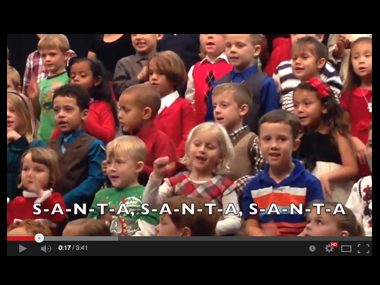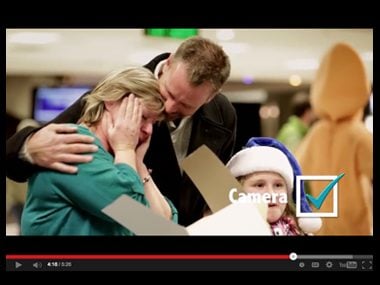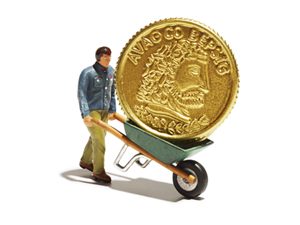We
know, we know -- your state is the best. Whether you hail from
somewhere with the most exquisite coastline, the hippest art scene or
the most sublime mountain range in the nation, we bet you've found at
least one reason to be seriously proud of your home state. We did you a
solid and found one more:
Alabama, you helped put the first man on the moon.
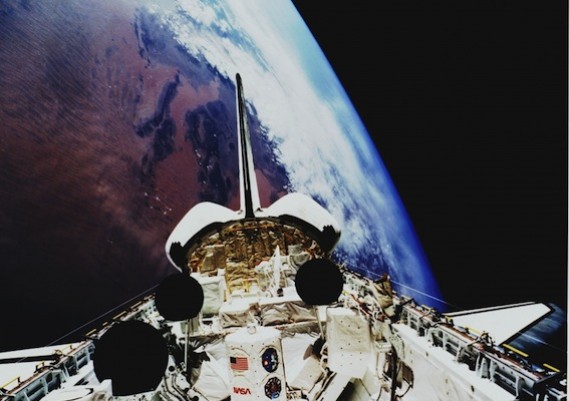
Huntsville's
Marshall Space Flight Center,
also called "the Rocket City," has played a vital role in the U.S.
Space program since its beginnings. The Marshall Center developed the
Saturn V rocket that sent America to the moon and spearheaded high-priority projects like
The Hubble Space Telescope. The photo above depicts the
Space Shuttle Atlantis, which was part of a series of Spacelab missions managed in Huntsville, Ala.
Image: NASA
Alaska, you have more bald eagle neighbors than anyone else in the world.
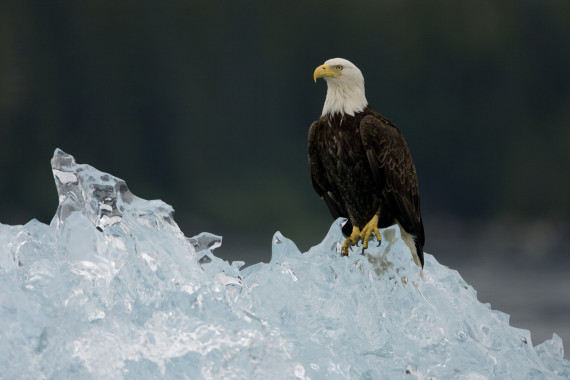
Indeed, the
Alaska Chilkat Bald Eagle Preserve is
possibly the most patriotic landscape in the nation. The 48,000-acre
sanctuary hosts some 3,000 bald eagles who gather between the months of
October and February to enjoy the season's late salmon supply. It was
established to protect Alaska's bald eagle population, and now boasts
the largest concentration of the regal birds in the world.
Arizona, you pioneered the McDonald's drive-thru.
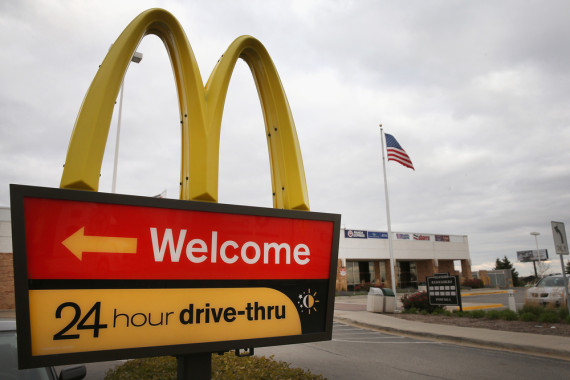
The
first drive-thru McDonalds opened in Sierra Vista in 1975. The drive-thru was established to accommodate
off-duty soldiers from a nearby military base,
as they were not allowed to leave their vehicles to enter a restaurant
while wearing their uniforms. Of course, McDonald's would quickly
discover that plenty of civilians also appreciate the convenience of a
drive-thru.
Arkansas, you're basically coated in cheese dip.

In Arkansas,
cheese dip is more than just an accessory to tortilla chips. While the rest of the world generally associates the dip with Mexican food,
Arkansas restaurants offer the dip everywhere, from burger joints to cafes. One Arkansas lawyer and filmmaker, Nick Rogers, made a documentary,
"In Queso Fever," tracking the history of cheese dip to an Arkansas restaurant called Little Mexico, circa 1935. Of course, some
Texans would contest that claim.
Regardless of its true origin, there's no doubt that Arkansas has
turned cheese dip into a point of pride -- and into a global
competition, with its
World Cheese Dip Championship.
California, without you, we may have never gotten the "all-you-can-eat" Chinese buffet.
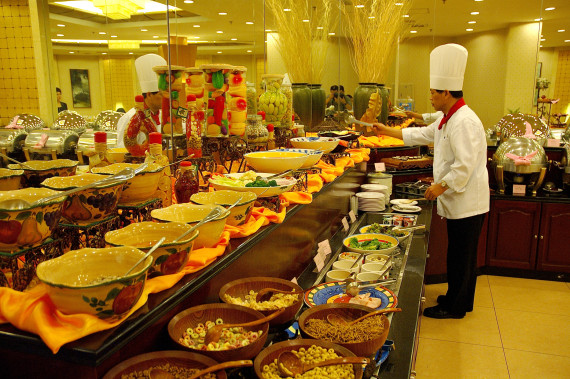 Norman Asing
Norman Asing opened an
all-you-can-eat Chinese buffet in San Francisco in 1849, which is believed to be the first Chinese restaurant in the U.S. Asing's restaurant,
Macao and Woosung, offered an unlimited platter of deliciousness for the price of $1. That's the equivalent of about a
$30 buffet nowadays. Eventually, this type of restaurant would spread deliciousness across the nation.
Colorado, you've got the most badass nature preserve in the country.

Just north of Denver, in Keenesburg, you'll find the
The Rocky Mountain Wildlife Conservation Center, which calls itself the country's
oldest wildlife sanctuary exclusively dedicated to carnivorous animals.
Founded in 1980, the spacious wildlife preserve was created
specifically to "prevent and alleviate cruelty to animals which are
abandoned or that are subject to deprivation or neglect by providing
care and boarding for such animals." The preserve has been a safe home
to an enormous range of enormous (and some smaller) animals, like lions
and wolves and emus. It currently accommodates over 290 carnivorous
"residents."
Connecticut, Disney World has nothing on your super special amusement park.
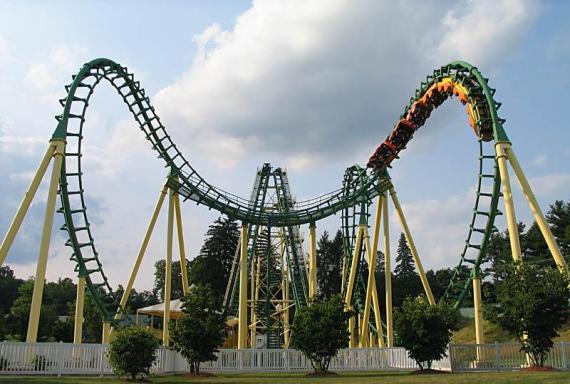
Bristol is home to any thrill-seeking history buff's dream destination. We're talking, of course, of
Lake Compounce, the oldest continuously operating amusement park in the United States!
Lake Compounce opened in 1846 as merely a humble "picnic park" with a gazebo, a few rides and a public swimming pool. Today, the
332 acre-wide amusement park boasts 44 rides, a beach and a water park. How's that for progress?
Image: Wikicommons
Delaware, you were once home to the world's tallest Lego tower.

This remarkable, architectural feat was made possible by over
500,000 Lego bricks and Delaware's truly dedicated
Red Clay Consolidated School District.
The tower earned the Guinness World Record in late 2013 for the
"Tallest Structure Built with Interlocking Plastic Bricks." The
impressive testament to Delaware's industrious youth stood at nearly
113-feet, or 11-stories tall, before being deconstructed.
Florida, you gave the world the gift of air conditioning.

It's
not surprising to learn that the sweltering heat of the Sunshine State
inspired one inventor to create the first-ever "comfort cooling"
machine, the legendary precursor to the air conditioner. Indeed, Dr.
John Gorrie of Appalachicola was convinced he could help bring down his
patients' raging fevers if only he could cool down their hospital rooms.
And so, as early as 1842, he constructed and operated the
first refrigerating machine for "comfort cooling."
This first "air-conditioning" machine eased the oppressive heat by
blowing air over buckets of ice. Today, hot climate dwellers everywhere
owe him their thanks -– perhaps none more so than his fellow Floridians.
Image: Shutterstock/Charnistr
Georgia, you gave us the greatest toy of the '80s.

The
Cabbage Patch Kid
was the brainchild of 21-year-old art student Xavier Roberts of
Georgia, who was inspired by the German craft of needle molding, a kind
of fabric sculpture. Little did he know that his dolls, originally
billed as "Little People," would inspire one of the biggest pop culture
phenomenons of the 1980s. According to the company, by the end of the
decade, 65 million Cabbage Patch Kids had been sold. Today, Cleveland,
Ga. is home to the Cabbage Patch Kid-themed Babyland General Hospital,
where Cabbage Patch Kids continue to be "adopted."
Image: Associated Press
Hawaii, you built the best place in the world to get lost.
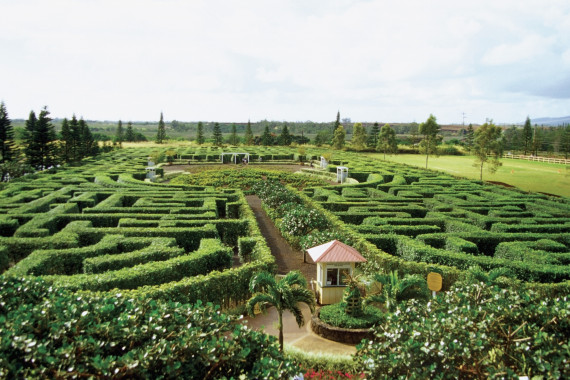
The Pineapple Garden Maze, built at
Hawaii's Dole Plantation, set the
Guinness World Record
for the "Largest Maze with a Permanent Hedge." Located in Wahiawa, the
maze spans 3.15 acres and includes almost two and a half miles worth of
paths. The maze opened in 1997 and was expanded in 2007.
Idaho, you helped bring a lifetime of entertainment straight into our living rooms.
 Philo Farnsworth
Philo Farnsworth, the "Forgotten Father of Television," moved to a
farm near Rigby, Idaho, when he was 13 years old. In 1927,
Farnsworth conceived a model for a TV that reproduced images electronically on a screen, which he drew out in a diagram for his chemistry teacher.
Illinois, you raced cars before it was cool.
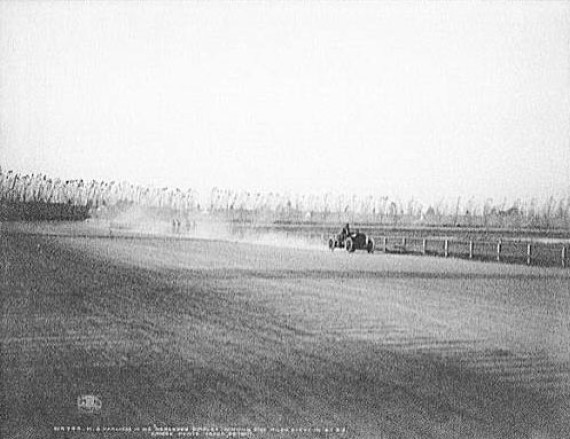
The
first American automobile race took place on Nov. 28, 1895. The contest,
sponsored by the Chicago Times Herald,
featured six contestants riding 54 miles from Chicago's Jackson Park to
Evanston, Ill. and back. Of course, it was hardly as fast-paced as your
NASCAR race of today: The winner clocked in at just over 10 hours,
averaging a less-than-heart-pumping speed of 7.3 miles per hour.
Image: Library of Congress
Indiana, you took watching paint dry to a whole 'nother level.
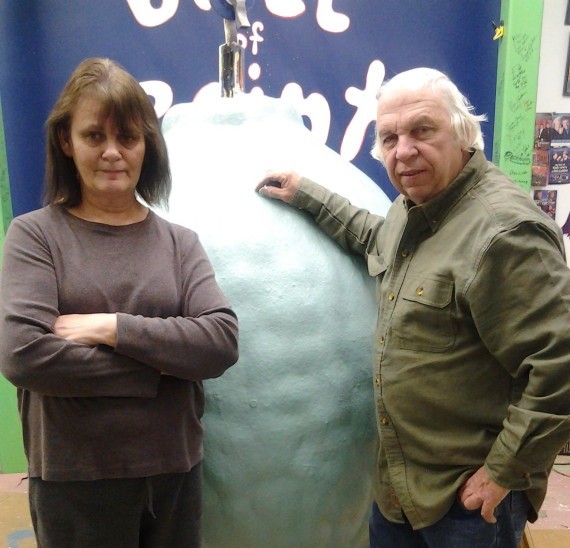 Mike and Glenda Carmichael of Alexandria
Mike and Glenda Carmichael of Alexandria
bill their roadside attraction as the "World's Largest Ball of Paint,"
which weighs in at over 4,000 pounds. Since 1977, the Carmichaels have
covered a standard baseball in approximately 23,400 layers of paint.
This super-sized ball of paint earned the couple a
Guinness World Record in 2004 for the "Most Layers of Paint."
Image: Chanel Carmichael
Iowa, you gave us something better to jump on than our beds.
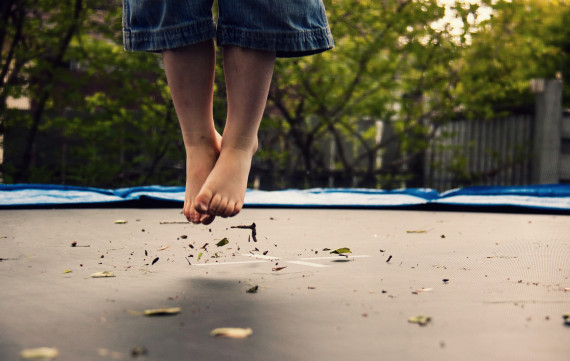
When he was just 16, Iowa native
George Nissen
created the first trampoline out of junkyard scraps in his parents'
garage. Little did he know that this piece of canvas stretched over a
rectangular steel frame would eventually bring countless of hours of joy
to the world. The young gymnast continued to develop the invention
while attending the University of Iowa, where he built the first
successful version. While on tour with an acrobatic group in Mexico, he
heard the Spanish word for diving board,
el trampolin, and "the trampoline" as we know it today was born.
Kansas, you brought us the frozen delight of the ICEE.

You’ll have to thank Omar Knedlik, one seriously creative Kansas Dairy Queen owner, for
inventing this favorite iced soft drink in the late 1950s.
Knedlik's Dairy Queen
didn’t have a soda fountain, so he stored bottles of soda in his
freezer. He began selling the soda bottles just after they'd first
turned to ice, and customers loved the frozen delight. He spent five
years developing and building the first ICEE machine. His legacy lives
on today -- according to the
ICEE company, some 500,000,000 of their beverages are sold every year. (And yes,
Slurpees are ICEEs licensed out to 7-Eleven under a different name.)
Kentucky, you've kept the bourbon flowing all over the world.
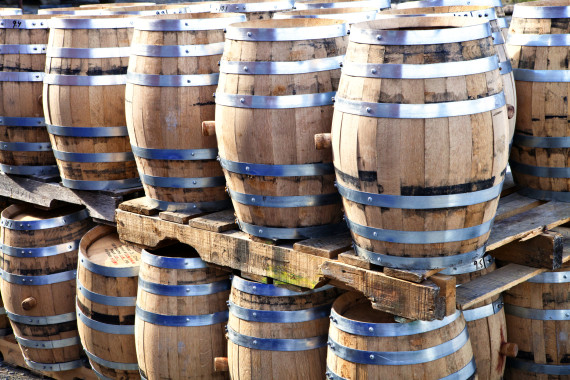
Indeed, the Bluegrass State manufactures
nearly all of the bourbon on the planet. In 2012, the state's inventory grew to
4.9 million barrels of bourbon, all aging to perfection in Kentucky. With a state population of almost
4.4 million, Kentucky actually has
more barrels of bourbon than it has people.
Louisiana, you just might be home to the next Hollywood.

Step aside, Los Angeles. Last year, Louisiana was the most popular location for U.S. film production, according to the
2013 Feature Film Production Society. The Society reported that 18 of the 108 major films of last year
were filmed in Louisiana,
while California and Canada tied for second with 15 films each. The
Bayou State set the stage for some of 2013's major releases, like "
Dallas Buyers Club."
Maine, you made the greatest whoopie pie the world has ever seen.
 Maine's official state treat
Maine's official state treat is the whoopie pie, and their passion for the confection is inspiring. In 2011, the
world's largest whoopie pie,
shown above, was completed in South Portland. The cookie treat, also
known as a "BFO," for "Big Fat Oreo," has never looked quite so
gargantuan as on that day in Maine, weighing a record 1,062 pounds.
There was also a big dose of heart behind the effort: Pieces of the
whoopie pie were sold to raise money to send treats to soldiers serving
abroad.
Image: Associated Press
Maryland, you gave us the most heavenly dessert at a down-to-earth price.
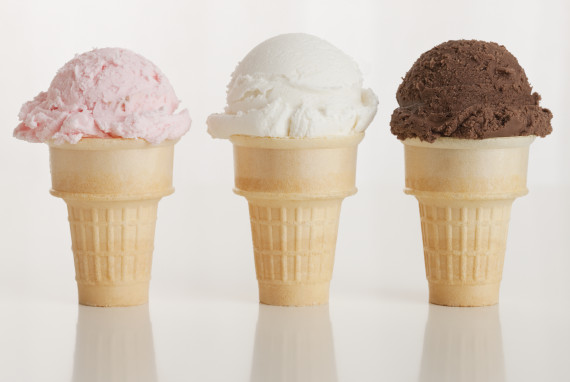 Baltimore dairy farmer Jacob Fussell
Baltimore dairy farmer Jacob Fussell
first started making ice cream as a way to utilize his summertime
supply of excess milk. Eventually, he opened the first ice cream factory
in Baltimore in 1851, thus establishing himself in dessert history
books as the Father of Ice Cream. At the time, ice cream had been a
pricey indulgence. Fussell was the first to mass-produce ice cream and
sell it at prices that were affordable to average Americans.
Massachusetts, you satisfied the Cookie Monster inside all of us with chocolate chip cookies.

Ruth Wakefield changed American childhood forever when she
baked the first chocolate chip cookie
in the kitchen of her Toll House Restaurant in Whitman. Though it's
rumored that the cookie was a happy accident, Wakefield claimed that the
recipe was meticulously planned. The state thanked her for the
groundbreaking confectionary invention in 1997 by declaring the
chocolate chip cookie the
Massachusetts state cookie.
Michigan, you make our coastline a whole lot brighter.
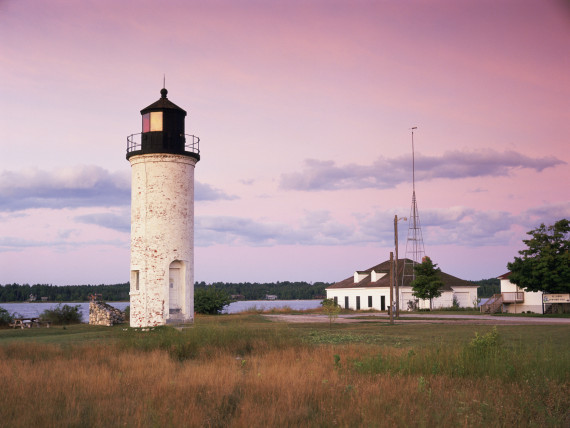
Estimates vary as to the exact number of lighthouses still stationed across Michigan, though the
U.S. Coast Guard tallies 90 of the luminous landmarks. They add a picturesque quality to the state's shore, which happens to be the
longest freshwater coastline in the U.S. Just be careful if you visit one
during winter!
Minnesota, you invented the hippest way to travel on foot.
 Rollerblades
Rollerblades
first skated onto the footwear scene thanks to two hockey-loving
brothers from Minnesota. In 1980, Scott and Brennan Olson remodeled a
pair of old inline skates, replacing the blades with polyurethane
rollers and attaching a rubber heel break. In doing so, they essentially
reinvented travel for the '90s kid. They started
Rollerblade Inc. out of their parents' basement and the design quickly swept the nation.
Mississippi, you brought root beer to the next level.
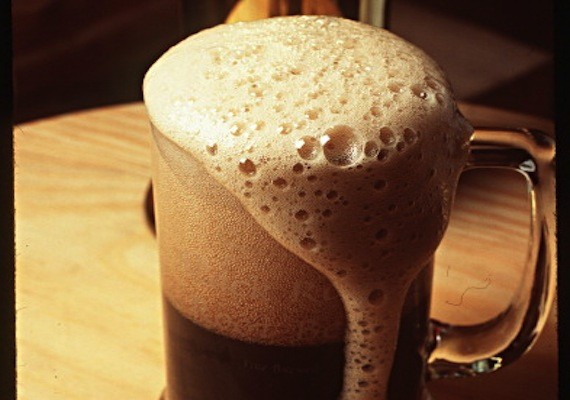
Edward Barq Sr., founder of
Barq's Root Beer,
moved to the beachside town of Biloxi and opened Biloxi Artesian
Bottling Works. There, in 1898, he bottled and sold his first root beer.
The
Barq family maintained ownership of Barq's Root Beer for almost 80 years
before selling it in 1976. Though the company's new owners moved the
Barq's headquarters to New Orleans, La., Billoxi continues to
commemorate its special place in soda pop history.
Missouri, you helped us say "I love you," "Happy birthday," and everything in between.

Hallmark was founded in Kansas City, Mo. by
Joyce Clyde Hall.
Inspired by the popularity of postcards in the early 20th century, Hall
moved to Kansas City with two boxes of postcards and one bold dream.
Though he lacked a formal education, he was a shrewd businessman, and he
built an enduring legacy in the greeting card industry. Today, Hallmark
boasts
a nearly $4 billion business.
Image: Associated Press
Montana, the largest snowflake ever recorded fell on you.

Montanans
can celebrate the fact that snowflakes practically the size of those
paper ones you made as a kid actually fell upon their home state. In
January 1887, in Fort Keogh, a
15-inch snowflake was recorded, with one
rancher saying the snowflakes that day were "larger than milk pans."
Nebraska, you gave the world the sugary refreshment of Kool-Aid.
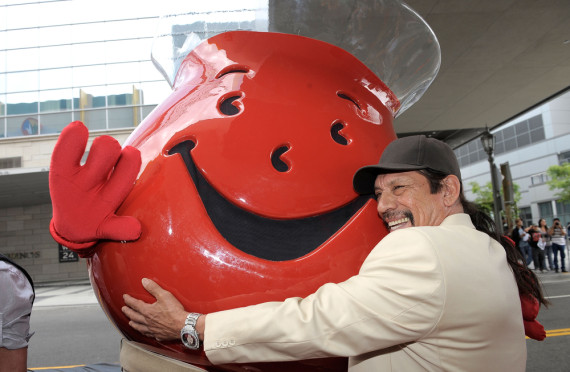
Cornhusker
Edwin E. Perkins invented Kool-Aid in 1927. Due to the immense love of the drink, a
Kool-Aid Days Festival is now held in his hometown of Hastings. The Nebraska government named Kool-Aid the
state's official "soft drink" in 1998.
Nevada, you're to thank for our favorite pairs of pants.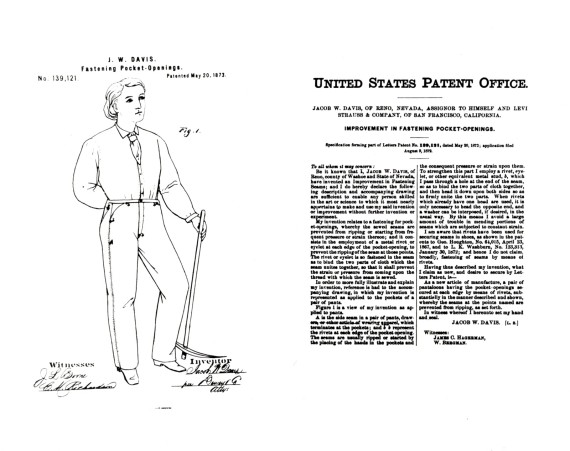
In 1873, Nevadan tailor
Jacob Davis successfully partnered with
Levi Strauss to receive a patent for riveted pants that would end up being called the blue jean. According to the
Reno-Gazette Journal, the first contemporary jeans were made to accommodate the rigors of chopping wood.
Image: Levi's
New Hampshire, you introduced us to the Segway.
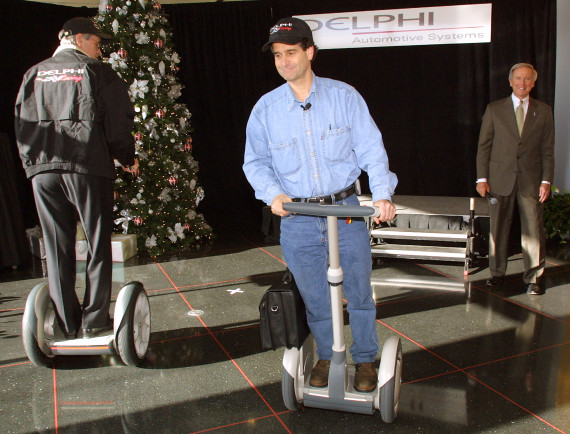
Although the Segway has yet to prove itself as a
world-changer, the delightfully dorky mode of transportation should still be a point of pride for New Hampshirites.
New Hampshire inventor
Dean Kamen
came up with the Segway, which is still one of the most recognizable
inventions of the 21st century. It's too bad its progress seems to be
stuck in
arrested development.
New Jersey, you made parties glitter (but unfortunately provided no way to clean it up).

Henry Ruschmann of Bernardsville invented contemporary glitter
in 1934. American partying was never the same. The company still exists today, with the slogan, "Our glitter covers the world."
New Mexico, you have a whole town devoted to pie, which proves the rest of us are doing something wrong.

New Mexicans have a whole town devoted to pie! For some unknown reason, Pie Town isn't the capital of the state, but it is
supposedly as delicious as it sounds. The pie-conomy of the town was established in the 1920s and this
U.S. Route 60 stop is still home to pie masters like the
Pie-O-Neer and
Good Pie Cafe.
Image: WikiCommons
New York, your "Nippletop Mountain" reminds us that we're still just 10-year-olds at heart.
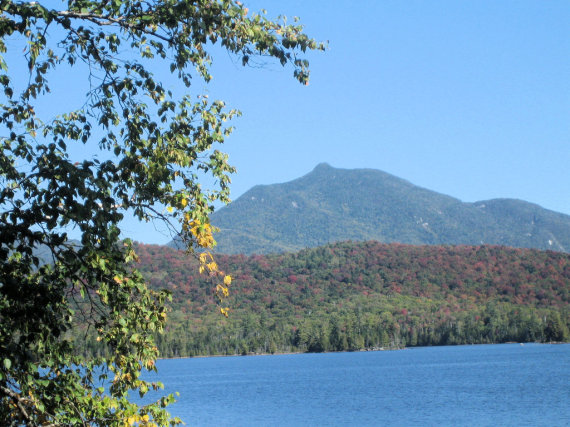 Nippletop Mountain
Nippletop Mountain is located in the Adirondacks and has an elevation of 4,620 feet. Apparently, Nippletop is known for being
particularly wet,
so if you plan on hiking to the tip, make sure to dress appropriately.
If you do manage to summit Nippletop, we recommend you take a moment
after and purchase this patch for only
$6.
Image: DeviantArt user Sassy-She-Devil
North Carolina, you combined eating donuts and running into a competitive event.

Pretty jealous of Tar Heelers for this one. The rules of the
Krispy Kreme Challenge
are straightforward in their awesomeness: "2400 calories, 12 doughnuts,
5 miles, 1 hour." Invented by a group of students at North Carolina
State University in 2004 as a dare, the challenge now attracts thousands
of racers every year. Before you get too worried about celebrating a
huge brand, know that proceeds go to charity. And for what it's worth,
Krispy Kreme (which was founded in
North Carolina) does make a
tasty doughnut.
Image: Krispy Kreme Challenge
North Dakota, you taught us how to make the most out of bath time with bubbles.

North Dakotans can get so fresh and so clean. Although the exact origins of who invented the
contemporary bubble bath are as murky as soapy water, the most popular bubble bath mix,
Mr. Bubble, came straight out of North Dakota. In 2011, Mr. Bubble Day was even declared a
state holiday.
Ohio, you literally molded our childhoods.

In 1965, Cincinnati resident Noah McVicker and his nephew, Joe, successfully received a
patent for the "soft, pliable plastic
modeling composition"
we all know as Play-Doh. Originally the modeling product was intended
to be used as a wallpaper cleaner, but, unlike the colorful clay, that
never stuck. Maybe they should have called it Play-Dohio! (Or not.)
Oklahoma, you gave watermelon the respect it deserves.
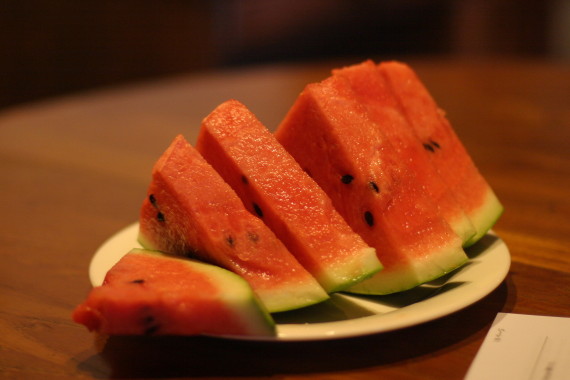
In
2007, Oklahoma decided watermelon was going to be its official state
vegetable. The sponsor of the bill, state Sen. Don Barrington,
explained
that watermelon is, of course, a fruit, "but it's also a vegetable
because it's a member of the cucumber family." They are both a part of
the
Cucurbitaceae family.
Oregon, you've got the most lucky charms "west of Ireland."

In what might be the most Portland thing ever, the city boasts the world's
"smallest park" which is also home to the only
"leprechaun colony west of Ireland." Mills End Park
became officially recognized as a city park on St. Patrick's Day in
1976, but had been created by writer Dick Fagan back in 1948. Fagan was a
journalist for the Oregon Journal, and after planting flowers in an
abandoned hole intended for a light post outside of his office, he began
writing about the travails of a small leprechaun colony in the park,
headed by a leader named Patrick O'Toole. Nowadays the park is regularly
decorated to make things nicer for the leprechauns, although the park
was "
occupied" in 2011 by toy soldiers.
Image: WikiCommons
Pennsylvania, you blew our minds with bubble gum.

In 1928, Walter Diemer invented the first commercially sold
bubble gum while working at the Philadelphia-based Fleer Chewing Gum Company. According to Diemer, the gum got its
iconic color because "pink food coloring was the only thing I had on hand."
Rhode Island, you're doing something very right by drinking coffee milk.

Rhode Islanders are lucky enough to get regularly treated to coffee milk, which became the state drink in
1993.
Why this drink hasn't taken off around the rest of the country is
certainly a mystery, as you'd think coffee-obsessed Americans would go
crazy over this godly nectar. For now, Rhode Islanders can be proud of
their
Autocrat coffee syrup, a key ingredient in coffee milk, and laugh at the rest of the country for being so naive.
Image: WikiCommons
South Carolina, you've got your very own dance.
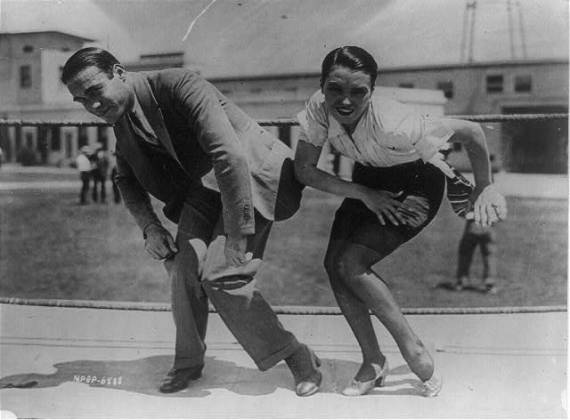
Popularized in
1923 by a song called "The Charleston," the dance with the same name took off throughout the '20s across the states. The
flappers, who totally
"demoralized" the country, raised Charleston's global profile, and no other dance as popular has been named after a U.S. city since.
Image: Library of Congress
South Dakota, your pheasant is the largest in the world.
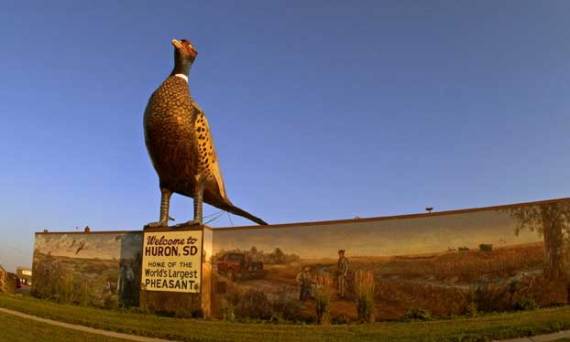
Rising 28 feet and weighing 22 tons, the
world's largest pheasant
towers over the town of Huron. According to legend, an extremely large
pheasant also towered over the early South Dakotan settlers, leaving
footprints that formed creeks and river valleys, but today this bird is
rooted pretty firmly to its perch off Highway 14.
Image: Huron
Tennessee, you forever ruined our teeth with cotton candy.
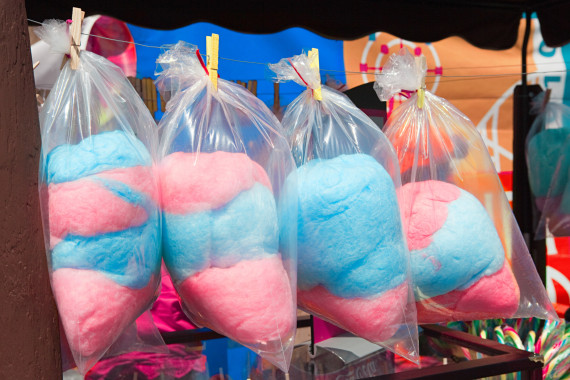
Contemporary cotton candy was invented
in 1897 by a dentist and candy maker out of Nashville. The sugary substance was originally called "fairy floss."
Texas, you made kids' birthday parties cool with laser tag.

Created by inventor
George Carter, the
"Photon" gaming center became the first laser tag center in the world when it opened in 1984. It began a
craze that still continues today.
Around the same time, another laser tag-like facility was founded in Texas called Star Laser Force, but the
Laser Tag Museum
has confirmed with the founders and a Certificate of Occupancy that
Photon came first. Star Laser Force did up end selling its technology to
a toy company, however, and therefore was the first to get involved in
the "
home laser tag" market. Regardless, laser tag is a product of Texas.
Image: George Carter Inventions (photo of New Jersey location)
Utah, you extended your state pride into the night sky.
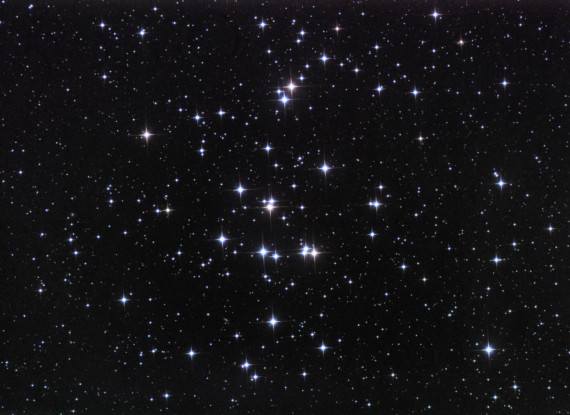
The Beehive Cluster is the
astronomical symbol of Utahns. It's a bright cluster that's located near the middle of the
Cancer constellation. Utah is super buzzy: The state insect is the honey bee and the state emblem is the beehive.
Vermont, muggles thank you for bringing them real-life Quidditch.

The
"Harry Potter" series may have been set across the pond, but the world
can thank Vermonters for the real-life World Cup of Quidditch. Students
from
Middlebury College created a muggle-version of the fantastical sport that now even has its own official sports association, the
International Quidditch Association. For years, the World Cup would take place in Vermont, but the 16th annual tournament is taking place in
Myrtle Beach, S.C..
One
of the Middlebury Quidditch founders and now current commissioner of
the IQA, Alex Benepe, gave HuffPost this great explanation of how the
idea came about:
We had an exceptionally athletic and
creative student body, and we wanted to create a new sport - so why not
try making quidditch real? Harry Potter is like the Star Wars of our
generation, a global cultural access point. With a few adjustments to
the rules, including a human snitch, and throwing in some dodgeballs and
brooms, we had a real game with a literary background, that was fully
embraced by the local community. It was only a matter of time before it
exploded to include official club sport teams at hundreds of college
campuses.
Image: Middlebury
Virginia, you both blessed and cursed the country with frat life.

Virginians are so frat. The first fraternity in the U.S. was founded by
five students at the
College of William & Mary in 1776 and was named Phi Beta Kappa.
Washington, you have real-life superheroes protecting one of your cities.
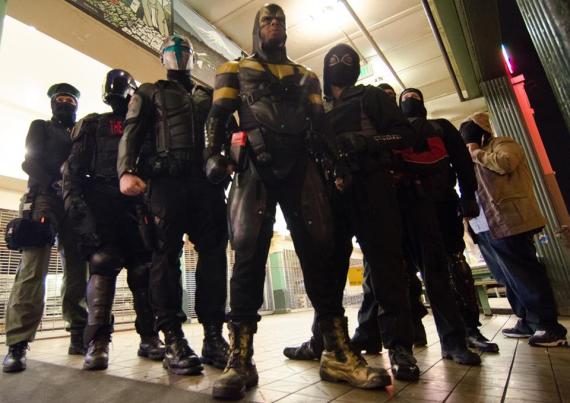 Phoenix Jones
Phoenix Jones
leads a real-life superhero team called the Rain City Superhero
Movement, which is comprised of costumed "former MMA fighters, police,
medical professionals, ex-military, active military and professional
camera men." The costumes aren't just for show -- in fact Jones wears a
$10,000 masterpiece made of bulletproof kevlar.
Besides fighting crime, Jones and his wife, "Purple Reign," give
anti-bullying talks at local schools and raise awareness for other
anti-abuse campaigns.
Image: Facebook user Phoenix Jones
West Virginia, you are the birthplace of Mother's Day.

West Virginians know how to appreciate their mothers. In
1912,
they became the first state to designate the Mother's Day holiday, with
the rest of the country quickly following. Unfortunately, the creation
of the holiday wasn't entirely joyful, as the
original advocate for the occasion ended up becoming extremely distraught that Mother's Day morphed into something so commercial.
Wisconsin, you host an annual cow chip competition, and therefore don't give a shit.

Cheeseheads know how to deal with crap. The annual
Cow Chip Festival
in Sauk Prairie (Prairie du Sac) challenges participants to throw cow
excrement as far as they can. In 2013, the farthest cow chip throw
measured
169.6 feet. According to the Cow Chip Festival's website, the Wisconsin State Legislature declared the "cow chip" to be the
unofficial state muffin in 1989. Yum.
Image: Wisconsin State Cow Chip Throw
Wyoming, even your tiniest towns have their own natural landmarks.

Wyoming has some small towns. Both
Lost Springs and
PhinDeli Town Buford have single digit populations, but the
latter has something extra special. Seemingly by magic (well, it's not exactly
magic), a tree is growing out of a rock in
the small town, which has a population of one, plus the tree.
Image: Flickr user Kent Kanouse
Source: HuffingtonPost.com
















